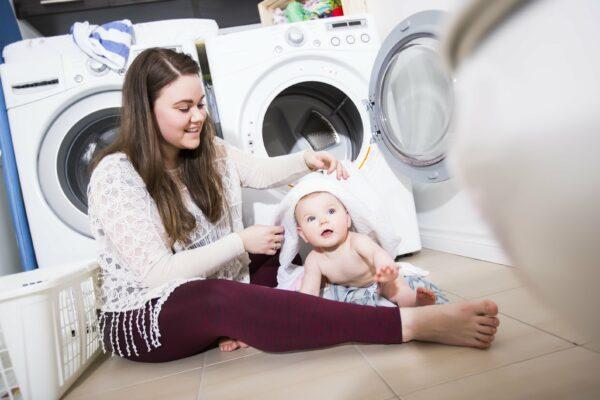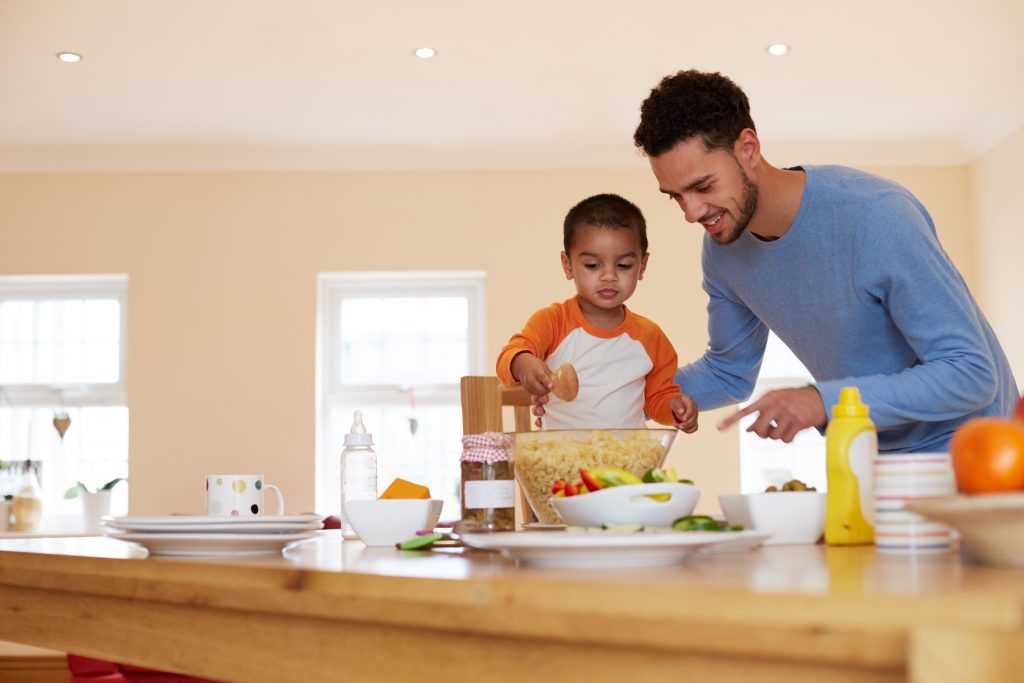Easy Daily Activities to Help Baby Reach Milestones
Did you know the average toddler takes 14,000 steps per day? That adds up to more than 2.5 miles your little one is walking!  These numbers might seem surprising, but walking is just one of the developmental milestones we see in children. We see toddlers taking awkward steps, stumbling, falling, and getting up all the time. Even the word, toddler, refers to the stage when a child practices walking. Just like walking, children need to practice these skills each and every day. These activities for babies will have them practicing these skills while engaging them through fun little games.
These numbers might seem surprising, but walking is just one of the developmental milestones we see in children. We see toddlers taking awkward steps, stumbling, falling, and getting up all the time. Even the word, toddler, refers to the stage when a child practices walking. Just like walking, children need to practice these skills each and every day. These activities for babies will have them practicing these skills while engaging them through fun little games.
Now, think about all the other skills a child needs to practice as they develop. This could include developing hand and finger strength to write, having the ability to speak and form sentences, being able to describe objects or ask questions, climb and use stairs, listening to sounds, adapting to new tastes and sensations, and much more. Read on to learn how you can encourage your little one to develop these skills as they grow.
Here are just a few activities for babies under 2 years old that will also help their development:
0-6 Months: Warm and Cuddly Wonder
Diaper-time Fun—Helps Sensory and Communication Development
At this age baby loves to be touched, tickled, and cuddled. Take advantage of the time you spend changing baby’s diaper. Try giving baby a quick massage after changing her diaper. Sing a little song to baby as you change her diaper or play some music. Tickle her toes and smile at baby.
Little Explorer—Motor Development
 If you’re sitting to fold laundry or to talk to friends in a living room, let baby lie down near you free of any equipment so she can explore. Baby will kick her feet and look at the world around her. Encourage her to try rolling over, reaching for things, and practicing tummy time.
If you’re sitting to fold laundry or to talk to friends in a living room, let baby lie down near you free of any equipment so she can explore. Baby will kick her feet and look at the world around her. Encourage her to try rolling over, reaching for things, and practicing tummy time.
Workout Together—Motor, Sensory, and Communication Development
It’s so important to get baby moving—and to keep mom and dad moving, too! From stretching to sit-ups, there’s so many activities for babies that can get your little one moving while getting in a workout. Here are some great ways to “workout” together.
6-12 Months: Curious Cutie
Food Play—Sensory Experience
Did you know that when your baby makes a mess while eating it helps them adapt to new sensations? Letting baby get food on their face and hands provides a friendly sensory experience. Your baby is curious about almost everything right now so encourage her to smell foods and touch them. Let foods get all over baby and don’t wipe them off immediately. Encourage different textures and tastes.
Backyard Fun—Exposes Baby to New Sights, Smells, and Sounds
If it’s a nice day, let baby explore the backyard safely. Take baby outside and let them touch the leaves and grass, or crawl through the yard. Playing in nature can help children of all ages with their motor skills, communication, social-emotional skills, sensory integration, and so much more!
Couch Stand—Helps Baby Practice Standing
As baby nears a year old, they’ll be more interested in trying to stand on their own. Help encourage baby to stand by doing some activities on the seat of the couch. Baby will be interested in trying to pull themselves to stand and cruise along the couch. This helps baby strengthen leg muscles to prepare for walking.
12-18 Months: Active Explorer
Spice Sniffs—Helps Develop Sense of Smell
This is the age when your baby can start to walk around and explore everything in her environment. If your taking a walk stop and let baby sniff a flower. If you’re cooking, pause let baby smell herbs and spices at a safe distance from their nose so they don’t inhale anything. Even though they won’t be able to try everything you’re eating, smelling still allows you to introduce new things to baby.
Echo—Helps Build Vocabulary and Communication Skills
Echo and expand what your child says. If your child makes a speech error, repeat their statement with a correction. Try adding new words to incorporate more complex vocabulary without changing the meaning of their original sentence. (e.g. If your child says “tree big!” try saying “yes, the Christmas tree is big and tall!”).
Adventure Time—Helps Sensory, Social-Emotional, and Executive Function
Try to factor in a little extra time for exploring. When you go to the grocery store or the post office give your toddler time to look around and touch things. Remember nearly everything your toddler is interacting with feels new, and every day is an adventure perfect for learning and growth.
18-24 Months: Talking Tot
Kitchen Fun—Uses Motor Skills and Offers Sensory Experience

Your baby is chirping, chatting, and making so much noise. Let your child stir the mixing bowl when you bake treats. Let your child start their own band. You can also give them clean pots and pans and spoons to play music on while you’re in the kitchen.
Play-by-Play—Communication Skills
Describe household chores while you do them. Have lots of conversations with baby and point out to your baby different shapes you see, e.g. “Dad is cleaning the table. Look at how round the table is. The table is a big circle.”
Keep on Walking—Motor Development
Let your child walk to places whenever you can. It may be easier and quicker to carry them or push them in a stroller but children need to practice walking, jumping, and running to improve these skills.
Spoon Skills—Sensory and Feeding Skills
Encourage your toddler to feed themselves. Work on using spoons and scooping. Let your child get messy and let them use their hands and noses to investigate new foods. Explain what foods are good and why they’re good foods (for example, “Carrots are good because they have so many vitamins. They’re bright orange because of how many vitamins are in them.”).





